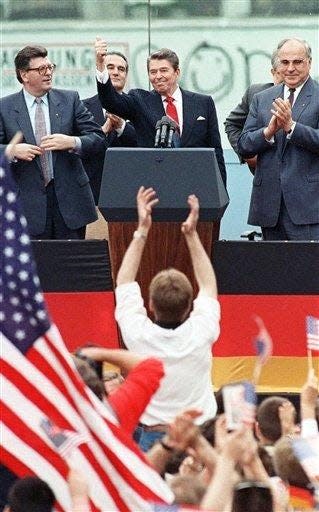Ronald Reagan would have opposed Tucker Carlson and Republican Party Russia apologists
- Oops!Something went wrong.Please try again later.
- Oops!Something went wrong.Please try again later.
- Oops!Something went wrong.Please try again later.
As I watched Tucker Carlson explain how a delightful Moscow grocery “radicalized” him against American leaders, a tectonic shift in our politics became painfully apparent.
Russia hasn’t seen a glorious resurrection as a global powerhouse, but it does seem to be lurching towards the U.S.S.R of old. Too many of my Republican brethren have, like the leftists of my childhood, fallen for the lie that Russian appeasement is an American ideal.
When President Ronald Reagan demanded that the Soviets tear down the Berlin Wall, America was not entirely united behind his approach.
“It just makes me have utter contempt for Reagan,” said House Speaker Jim Wright (D-TX). “He spoiled the chance for a dramatic breakthrough in relations between our two countries.”
U.S. foreign has swung from strong defense of democracy to weakness
Wright reflected the attitude of many Democrats who preferred to continue the détente with Russia that existed for a decade before Reagan took office. From the late 1960s to the end of the 1970s, the United States and Russia negotiated numerous agreements on arms control and European security. Wright and others had hoped for a cooperative internationalism that would contain communism while avoiding a direct military conflict.
The Vietnam War had reduced John F. Kennedy’s robust international leadership to George McGovern’s “Come Home America” campaign slogan. Richard Nixon won the ensuing election in a landslide. Nixon’s corruption gave way to President Jimmy Carter who again embraced a more isolationist foreign policy. His naivete was brutally exposed when Iranian militants took control of the American embassy in Tehran and the Soviet Union invaded Afghanistan.
In a 1977 ABC "World News Tonight" interview, Carter sheepishly admitted that the Russian aggression “made a more dramatic change in [his] opinion of what the Soviets’ ultimate goals are than anything they’ve done in the previous time I’ve been in office.” Then as today, Russian leadership isn’t coy about its ambitions.
Ultimately, Reagan took office and promoted liberal democracy as morally and economically superior to communism. As General Secretary Mikhail Gorbachev introduced the policies of glasnost (“openness”) and perestroika (“restructuring”), the communist regime lost both control of the media and the Russian economy. The Soviet Union was ill equipped to deal with a heavy state bureaucracy colliding with increased economic liberty. Citizens permitted to complain about it publicly only accelerated the demise of the communist regime.
Putin wants nothing less than to force Ukraine into complete surrender
The Berlin Wall fell and then so did the Soviet Union.
Russian President Vladimir Putin views that moment as “the greatest geopolitical catastrophe of the century.”
After brutally invading Ukraine, Putin is as unmistakably clear about his objectives as his predecessors. His terms for peace are nothing less than total capitulation by Ukraine.
The difference these days is that Republicans are reprising the role of isolationist Democrats by suggesting that America’s best strategy is giving Putin the “peace” he seeks.
Utah’s U.S. Sen. Mike Lee recently claimed on X, “Prolonging this war doesn’t help the people of Ukraine.”
Prolonging this war doesn’t help the people of Ukraine.
— Mike Lee (@BasedMikeLee) February 13, 2024
The justification to oppose military aid to Ukraine conveniently ignores that the people of Ukraine seem particularly interested in continuing the war for their own sovereignty. They’re asking for America and Europe to help them.
U.S. Sen. Tommy Tuberville, R-Alabama, shares a similar perspective. “Vladimir Putin wants out of this. You hear that on Tucker Carlson. Diplomacy, what happened to diplomacy?” Tuberville remains convinced that Ukraine is outmatched and must bend the knee to Russia.
More: Senators Blackburn and Hagerty's votes against Ukraine funding amount to a Putin win
Tucker Carlson played the patsy of an aging autocrat
Politics do indeed shift over time, but Republicans like Lee and Tuberville sounding like McGovern and Democrats of the 1970s is truly shocking. Reagan would, without a doubt, directly oppose the contingent of the Republican Party that has become Russian apologists.
Worse yet, Russia isn’t even close to the global power it once was.
America’s GDP is more than 10 times larger than Russia’s. If Russia were a state, it would rank behind California, Texas, and New York in terms of economic production. Florida will soon join the ranks of American states with an economy bigger than Russia’s. Broken down by population, Russia’s per capita GDP is lower than every single state in the union.
More than a third of Russia doesn’t even have access to “safely managed sanitation services.”
A wild-eyed Carlson plays the patsy of an aging authoritarian whose delusions of grandeur are costing a tremendous number of Russian and Ukrainian lives. The KGB-trained Putin hopes to manipulate Western perception through an American media personality struggling to reclaim his lost spotlight.
The doctrine of appeasement didn’t hold against a much more powerful Soviet Union. We certainly should not pursue it now.
Push for peace through strength: An American attribute
Both Kennedy and Reagan endured a number of proxy conflicts that never escalated to global warfare between the United States and the U.S.S.R. Our two nations have and had a compelling interest in avoiding direct hostilities in spite of our opposing political philosophies.

Republicans like Lee and Tuberville who agitate for Ukrainian surrender too easily forget that America itself once fought for its sovereignty against the greatest military power in the world at the time. The odds were not favorable. But for the French providing supplies, arms and ammunition, training, and even troops, America would not exist.
Our leaders must push for peace through strength, not surrender to a decrepit Soviet bully. Republicans have a choice. Follow Carlson, Lee, and Tuberville in becoming more like the Democrats of old or revive American leadership like Reagan did after Carter.
Modern Democrats have a choice too. They must either genuinely return to Kennedy’s promotion of liberty around the globe or concede that their rejection of Putin’s aggression is only as lasting as Donald Trump’s political prospects.
The stakes couldn’t be higher. We might be watching Tucker Carlson, but China is watching us.

USA TODAY Network Tennessee Columnist Cameron Smith is a Memphis-born, Brentwood-raised recovering political attorney who worked for conservative Republicans. He and his wife Justine are raising three boys in Nolensville, Tennessee. Direct outrage or agreement to smith.david.cameron@gmail.com or @DCameronSmith on X, formerly known as Twitter. Agree or disagree? Send a letter to the editor to letters@tennessean.com.
This article originally appeared on Nashville Tennessean: Peace through strength: Reagan would not have kissed Putin's ring

